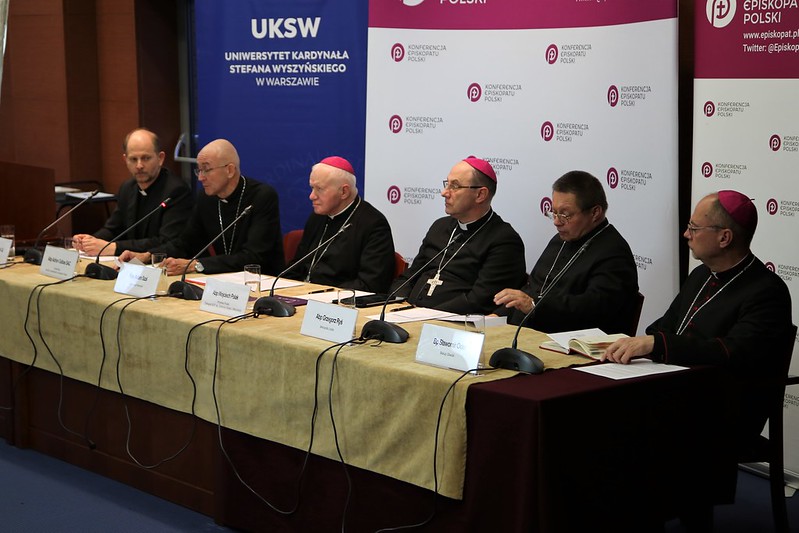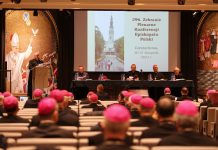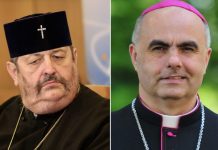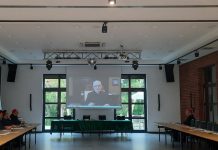The continental stage of the Synod on Synodality, the sanctity of John Paul II, preparations for the beatification of the Ulma family, and assistance to the victims of sexual abuse were the subjects discussed by the bishops at a press conference following the 394th Plenary Assembly of the Polish Bishops’ Conference, held on 13-14 March 2023 in Warsaw.
Archbishop Adrian Galbas, coordinator of the Synod on Synodality in the Church in Poland, recalled that Pope Francis “invited us to reflect on how synodality, which has been present in the Church from the very start and which received an additional impetus during the Second Vatican Council, is implemented in the Church.”
Archbishop Galbas pointed out that the Continental Assembly for Europe, held in Prague in February this year, was a meeting of all the Bishops’ Conferences of Europe. “We met in profound truth,” he stressed, adding that the meeting in Prague was “a great and candid meeting of different experiences, at times optimistic and joyful and sometimes difficult.” “I was struck in Prague by the atmosphere of profound dialogue,” “where we boldly and openly spoke of the differences in the perception of the current problems of the Church,” stressed Archbishop Galbas.
Archbishop Grzegorz Ryś, Metropolitan of Łódź, referred during the press conference to the beatification and canonisation of Saint John Paul II: “ The canonisation process that has been carried out leaves no doubt about the sanctity of John Paul II,” indicated the archbishop, quoting the communiqué issued by Polish bishops upon the conclusion of the Plenary Assembly. “This canonisation process was simply extremely reliable,” stressed Archbishop Ryś.
Furthermore, Metropolitan Archbishop of Łódź observed that in the part of the beatification and canonisation process concerning the life in Poland of Karol Wojtyła, the historical commission set up in Krakow reviewed documents from the period when Wojtyła was Archbishop of Krakow. “Basically, there were two historians working in this commission, Fr. Prof. Jacek Urban, who is currently Director of the archives of the Metropolitan Curia in Krakow, and myself, who was then Director of the archives of the Wawel Cathedral Chapter,” he added. He pointed out that in addition to these two archives, the members of the commission also worked in the archives of the Institute of National Remembrance (IPN), which was created not long before.
Archbishop Ryś recalled that historical ecclesiastical archives are available for scholarly research under normal archival rules: “The only limit in church and state archives, with the exception of the IPN, is the length of non-disclosure of archival documents; it is 50 years, while in the Vatican it is 70 years. If today we are talking about non-disclosure of records in relation to Cardinal Wojtyła, it covers at most the last five years of his stay in Poland, in Krakow. If someone would like to have access to documents from the period after 1973, they would have to ask the director of the archives for access to these records,” pointed out the Metropolitan of Łódź. He added that as far as archival documents from the time of Cardinal Karol Wojtyła in Poland are concerned, today there are no obstacles to access them on normal principles, as in any research archive.
The Metropolitan of Łódź emphasised that the difficulty lies not in the accessibility of the archives, but in their interpretation: “Certainly, there is no room in this interpretation for an ahistorical approach.”
Bishop Sławomir Oder of Gliwice, referring to the beatification and canonisation process of John Paul II, of which he was postulator, observed that the only dispensation in the process of John Paul II was that on the period of five years following his death. “The voice of the People of God is a starting point in any beatification process,” stressed Bishop Oder.
He furthermore stressed that Pope Benedict XVI, a close collaborator of Pope Wojtyła, was personally convinced of the sanctity of John Paul II. “The greatness and integrity of Benedict XVI for the Church and his sanctity seals the truthfulness and authenticity of his conviction,” added Bishop Oder.
Bishop of Gliwice highlighted the fact that the work of the beatification commission was highly professional and very efficient. He added that the final step in the process for declaring John Paul II a saint is a miracle through the intercession of the candidate for the altars. In the case of the beatification process of John Paul II, the examination of the miracle of the healing from Parkinson’s disease of Sr. Marie Simon-Pierre took into account more than 20 expert analyses. The same was true of the miracle required for canonisation.
Bishop Oder pointed out that no one was deliberately left out in the questioning of witnesses.
Archbishop Adam Szal of Przemyśl introduced the bishops to the preparations for the beatification of the Ulma family, scheduled to take place on 10 September 2023 in Markowa. “This will be an unprecedented event in that one beatification act will raise to the glory of the altars an entire family: parents Józef and Wiktoria Ulma and their seven children. One additional precedent is that beatified in this act will be an unborn child, who was under the mother’s heart at the moment of death,” indicated Archbishop Szal.
He furthermore observed that the Ulma family were murdered because they had offered shelter in their home to eight Jews. He added that the liturgical commemoration of the Ulma Family will be celebrated on July 7, the day the Ulmas got married.
Subsequently, Primate of Poland Archbishop Wojciech Polak noted that “today the bishops have decided to start work on the appointment of a team of independent specialists to conduct research on the sexual abuse of minors by certain clergy in Poland.”
“The tasks of the team will certainly include a thorough examination of the documents, records in both state and church archives, with a view to showing the contents of the documents in their entirety, taking into account the law and the state of knowledge, as well as the socio-cultural context.” Archbishop Polak added that he hoped that “the work of the team will, above all, be a genuine help for those who have been harmed, who deserve the truth in the process of healing and the help that comes with the process of shedding light on all these cases.”
The Primate of Poland further emphasised how much the Church in Poland has already been doing to protect minors and to help the victims, both through the Centre for Child Protection and St. Joseph’s Foundation.
Press Office of the Polish Bishops’ Conference
Translation: M. Turski / Office for Foreign Communication of the Polish Bishops’ Conference

 Polski
Polski







